Death of Argentina's Videla evokes painful memories
- Published
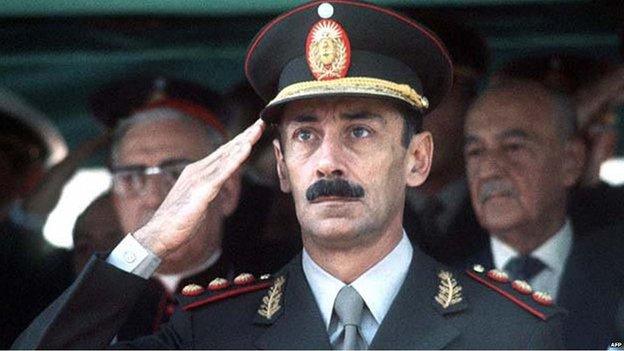
Former Argentine military leader Jorge Rafael Videla died aged 87 while serving a sentence for crimes against humanity.
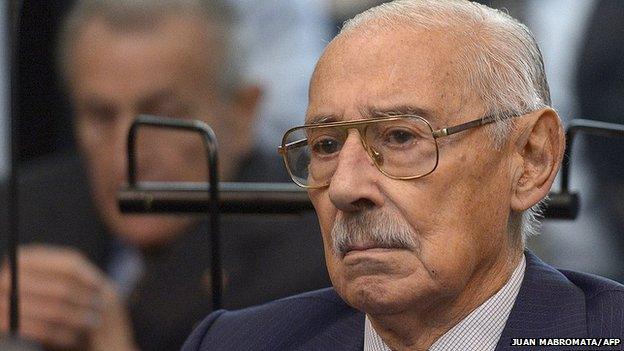
He is said to have died of natural causes in prison.
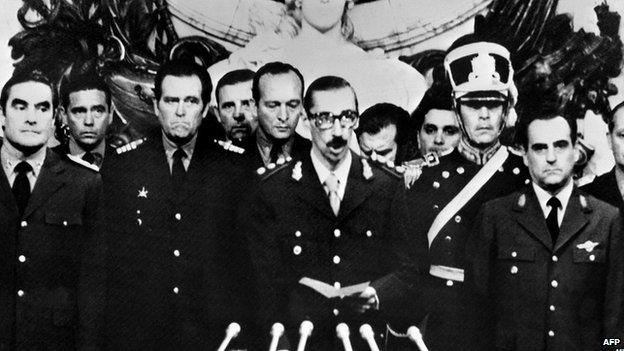
He came to power in 1976. Opponents of the regime were rounded up in the "Dirty War", which saw thousands of people "disappear".
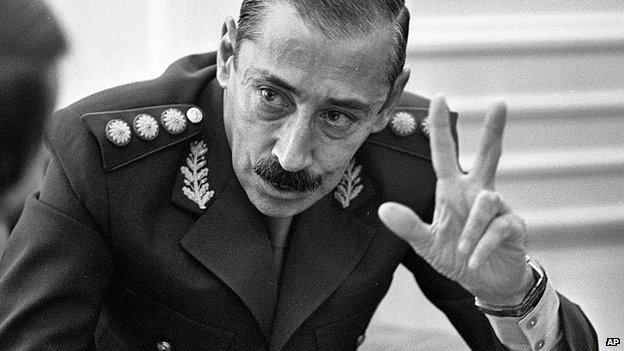
He was sentenced to life in prison for torture, murder and other crimes in 1985, but pardoned in 1990 under an amnesty given by the president at the time, Carlos Menem.
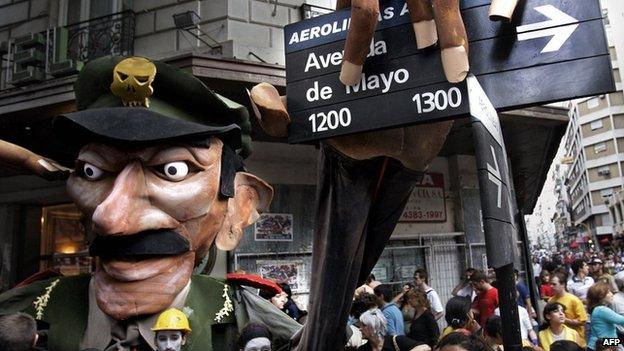
In April 2010, the Supreme Court upheld a 2007 federal court move to overturn his pardon.
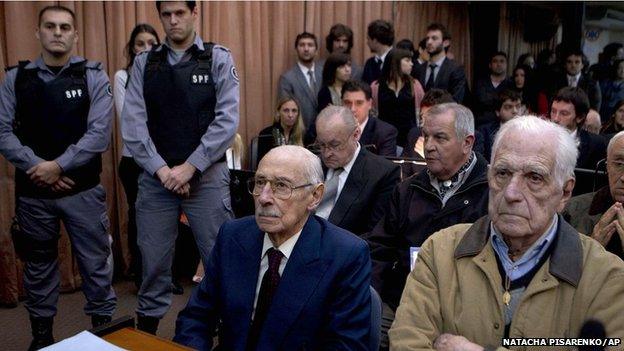
In 2012, he was also convicted of overseeing the systematic theft of babies from political prisoners. A court in Buenos Aires sentenced him to 50 years in prison, while another ex-military leader, Reynaldo Bignone, received 15 years for his alleged role in the crime.
A state criminal, a dictator, a repressor - there are many ways Argentines refer to former de-facto president Jorge Rafael Videla, who has died in prison at the age of 87.
But there is something almost everyone seems to agree upon - he was probably the most hated man in Argentina.
Videla was a symbol of a whole era of coups, military rule and fierce repression in South America.
He came to power in 1976, leading a coup against the government of Isabel Peron, a troubled president who failed to cope with a deep financial crisis, left-wing guerrillas and widespread state terror.
Under his regime between 1976 and 1981 an estimated 30,000 political opponents were rounded up and killed in what became known as "the Dirty War", human rights organisations say.
Practices used against opponents of his military junta included the kidnapping of their new-born children who were later given to members of the army and state officials.
Tortured militants were thrown from planes and helicopters into the River Plate so their bodies would never be found.
They received the name "desaparecidos" - the missing ones - and since then their mothers have waited and campaigned to find their remains or meet their lost grandchildren.
Life in Prison
The Mothers of Plaza de Mayo - named after the central Buenos Aires square where they rallied to seek justice - celebrated when in 2010 Jorge Videla was sentenced to life in prison for the torture and deaths of 31 prisoners.
He became the first Argentine de-facto leader to be convicted.
The conviction became a model of justice to left-wing activists in neighbouring countries who also suffered at the hands of military regimes in the 1970s and 80s.
Still, there was little sign of regret from Videla himself.
Speaking about the missing activists and whether he considered himself responsible for their deaths, he once said:
"They are just that… desaparecidos. They are not alive, neither are they dead. They are just missing."
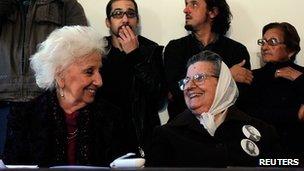
Grandmothers of the Plaza de Mayo expressed relief at the death of Videla
During an interview from prison he recently asked Argentines to rise up in arms against current President Cristina Fernandez de Kirchner, whom he blamed for the country's problems.
President Fernandez and her late husband, Nestor Kirchner, were left-wing activists during the years Videla was in power.
"Today Argentina is facing a new war, this time without weapons, they are seizing the country's institutions," Videla said.
But very few paid attention to the former ruler.
Memories
Some mothers of the disappeared have said they feel more at peace now that Videla is gone.
But Nobel Peace Prize winner Adolfo Perez Esquivel says his death "has brought an end to his physical existence but not what he did against the people".
And many Argentines warn that he is taking with him too many secrets about the crimes committed under the years of the Dirty War.
"He never said what all the mothers and grandmothers from Plaza de Mayo have been waiting [to hear]," one young woman, Muriel, says in Buenos Aires.
"He never revealed what really happened and furthermore, he never felt any guilt," she adds.
The years of the military regime - La Dictadura (Dictatorship) as most people call it here - are still a fresh memory in Argentina.
And the figure of Gen Videla will cause controversy even after his death.
"He didn't do anything to my family or myself," says Carlos, a Buenos Aires resident.
"I think that period of Argentine history was dark but I also think that the people who were affected during those years were involved in something," he says.
Jorge Videla died in his sleep, serving a prison sentence for being responsible of human rights abuses such as torture or kidnapping.
But his opponents say his biggest crime was opening a wound that 30 years later Argentina is still trying to heal.
- Published22 December 2010
- Published4 April 2013
- Published24 March 2013
- Published6 July 2012
- Published6 July 2012
- Published6 July 2012